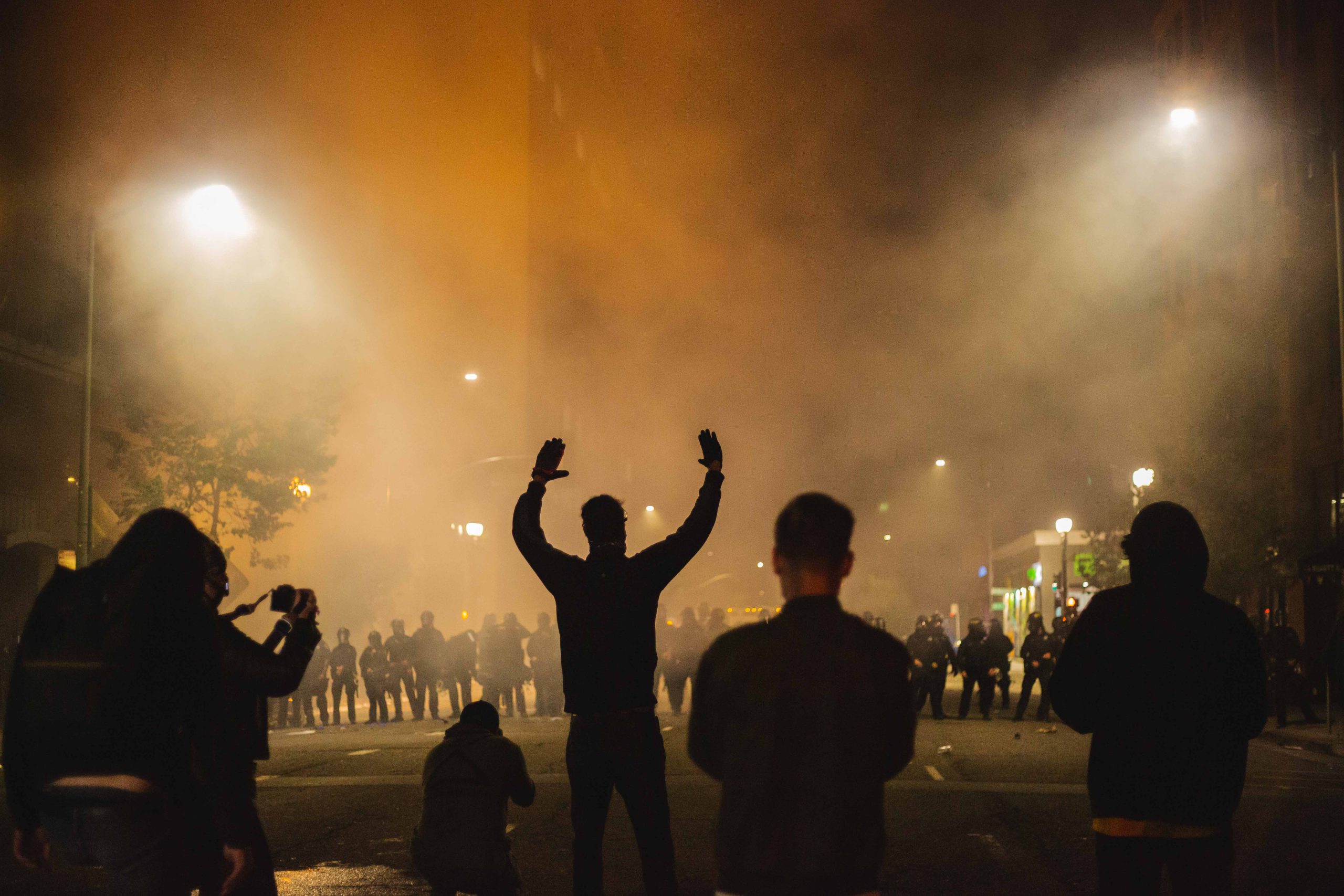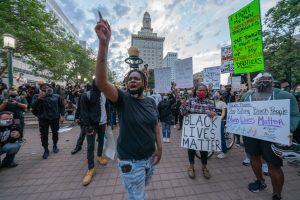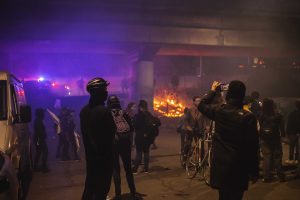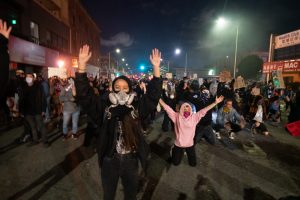Activism
Days of Protest Spark Mixed Reactions, Oaklanders Question Who Leads Destruction

Thousands of people took to Oakland streets beginning May 29 for what was largely a peaceful protest against the death of George Floyd, a Black man in Minneapolis, Minn., who died after a white police officer knelt on his neck for nearly nine minutes.

Oakland protester Taylor energizes a growing crowd as they chant “No Justice, No Peace,” at Frank Ogawa Plaza on May 29. Thousands marched in Oakland on Friday protesting the death of George Floyd and demanding an end to police brutality. Photo by Michelle Snider.
By 11:00 p.m. on the first night of protests in the Bay Area, Twitter was filled with videos of looting and fires in Downtown Oakland. Walgreens on Broadway was looted and there were reports of a small fire inside. CVS on Broadway was also looted and the city center Starbucks was set on fire.
A Honda CR-V was driven off the Honda of Oakland showroom in front of a large crowd, and the brand new Target store on Broadway was smashed up, looted and is now to be closed indefinitely.
On Twitter, some were outraged at the looting and highlighted that the protests were mostly peaceful. A Chamber of Commerce representative said on May 30 that “a small band of well-mobilized vandals” had once again targeted the city’s merchants and most vulnerable people.”
More of what happened at the start of the looting in Oakland last night. I was there throughout the night, same narrative, white people inciting the violence and break-ins. They did not come here to protest, they did not come here for us. #OaklandProtest #GeorgeFloyd #BLM pic.twitter.com/wuXSOmF3gj
— peanut butter cup (@deshawnieboy) May 30, 2020
“We will not let out-of-town individuals undermine this legitimate protest and destroy our local economy,” said Barbara Leslie, president and CEO of the Oakland Metropolitan Chamber of Commerce.
Most businesses targeted were corporations, but some Black-owned and smaller businesses were targeted as well, including Oakland shop Queen Hippe Gypsy, owned by Lillianna Ayers — a Black woman.
After nightfall on May 29, a crowd attempted to gain access to I-880, throwing water bottles at police officers and launching a flare that started a small grass fire. Others headed toward the Oakland Police Department (OPD) building on Broadway and took a knee as they were met with a line of police officers.

A crowd attempts to gain access to the 880 freeway. A flare was launched by the crowd and started a small grass fire. Photo by Saskia Hatvany.
OPD swiftly deemed the protest an “unlawful gathering” and allowed three minutes for protesters to disperse before launching tear-gas.
Meanwhile, several small groups split off and proceeded to break the windows of Chase and Wells Fargo banks and other businesses. Trash cans were dragged into the streets and some were set ablaze.
After midnight, two federal officers were shot while on guard at the Ronald V. Dellums Federal Building at 1301 Clay St. One of them, Dave Patrick Underwood, succumbed to his injuries and died.
The shooting was called an “an act of domestic terrorism,” by Department of Homeland Security Acting Deputy Sec. Ken Cuccinelli at a Wash., D.C., news conference.
But California Gov. Gavin Newsom warned that the shooting should not be quickly associated with the acts of peaceful protesters. “No one should rush to conflate this heinous act with the protests last night,” he said.

Protesters kneel peacefully in front of a line of Oakland Police on Monday, May 29. Police declared the protest an “unlawful assembly,” and allowed three minutes for people to disperse before unleashing tear gas. Photo by Michelle Snider.
The looting continued throughout the weekend in downtown Oakland, Emeryville and the Fruitvale area, leading local officials to impose a curfew from 8:00 p.m. to 5:00 a.m. on Monday. Several peaceful daytime protests also occurred, including a caravan of over 1,000 cars around Lake Merritt, and a march down Broadway on Monday from Oakland Technical High School at 42nd street that ended at the Oakland Police Department on Seventh street.
Approximately 15,000 people attended the Monday student-led rally and march, according to Oakland police who observed from a helicopter.
Activism
Oakland Post: Week of April 24 – 30, 2024
The printed Weekly Edition of the Oakland Post: Week of April 24 – 30, 2024

To enlarge your view of this issue, use the slider, magnifying glass icon or full page icon in the lower right corner of the browser window. ![]()
Activism
Oakland Post: Week of April 17 – 23, 2024
The printed Weekly Edition of the Oakland Post: Week of April 17 – 23, 2024

To enlarge your view of this issue, use the slider, magnifying glass icon or full page icon in the lower right corner of the browser window. ![]()
Activism
Oakland Schools Honor Fred Korematsu Day of Civil Liberties
Every Jan. 30, OUSD commemorates the legacy of Fred Korematsu, an Oakland native, a Castlemont High School graduate, and a national symbol of resistance, resilience, and justice. His defiant stand against racial injustice and his unwavering commitment to civil rights continue to inspire the local community and the nation. Tuesday was “Fred Korematsu Day of Civil Liberties and the Constitution” in the state of California and a growing number of states across the country.

By Post Staff
Every Jan. 30, OUSD commemorates the legacy of Fred Korematsu, an Oakland native, a Castlemont High School graduate, and a national symbol of resistance, resilience, and justice.
His defiant stand against racial injustice and his unwavering commitment to civil rights continue to inspire the local community and the nation. Tuesday was “Fred Korematsu Day of Civil Liberties and the Constitution” in the state of California and a growing number of states across the country.
One OUSD school is named in his honor: Fred T. Korematsu Discovery Academy (KDA) elementary in East Oakland.
Several years ago, founding KDA Principal Charles Wilson, in a video interview with anti-hate organization “Not In Our Town,” said, “We chose the name Fred Korematsu because we really felt like the attributes that he showed in his work are things that the children need to learn … that common people can stand up and make differences in a large number of people’s lives.”
Fred Korematsu was born in Oakland on Jan. 30, 1919. His parents ran a floral nursery business, and his upbringing in Oakland shaped his worldview. His belief in the importance of standing up for your rights and the rights of others, regardless of race or background, was the foundation for his activism against racial prejudice and for the rights of Japanese Americans during World War II.
At the start of the war, Korematsu was turned away from enlisting in the National Guard and the Coast Guard because of his race. He trained as a welder, working at the docks in Oakland, but was fired after the bombing of Pearl Harbor in 1941. Fear and prejudice led to federal Executive Order 9066, which forced more than 120,000 Japanese Americans out of their homes and neighborhoods and into remote internment camps.
The 23-year-old Korematsu resisted the order. He underwent cosmetic surgery and assumed a false identity, choosing freedom over unjust imprisonment. His later arrest and conviction sparked a legal battle that would challenge the foundation of civil liberties in America.
Korematsu’s fight culminated in the Supreme Court’s initial ruling against him in 1944. He spent years in a Utah internment camp with his family, followed by time living in Salt Lake City where he was dogged by racism.
In 1976, President Gerald Ford overturned Executive Order 9066. Seven years later, the 9th Circuit Court of Appeals in San Francisco vacated Korematsu’s conviction. He said in court, “I would like to see the government admit that they were wrong and do something about it so this will never happen again to any American citizen of any race, creed, or color.”
Korematsu’s dedication and determination established him as a national icon of civil rights and social justice. He advocated for justice with Rosa Parks. In 1998, President Bill Clinton gave him the Presidential Medal of Freedom saying, “In the long history of our country’s constant search for justice, some names of ordinary citizens stand for millions of souls … To that distinguished list, today we add the name of Fred Korematsu.”
After Sept. 11, 2001, Korematsu spoke out against hatred and discrimination, saying what happened to Japanese Americans should not happen to people of Middle Eastern descent.
Korematsu’s roots in Oakland and his education in OUSD are a source of great pride for the city, according to the school district. His most famous quote, which is on the Korematsu elementary school mural, is as relevant now as ever, “If you have the feeling that something is wrong, don’t be afraid to speak up.”
-

 Community2 weeks ago
Community2 weeks agoFinancial Assistance Bill for Descendants of Enslaved Persons to Help Them Purchase, Own, or Maintain a Home
-

 Activism4 weeks ago
Activism4 weeks agoOakland Post: Week of April 3 – 6, 2024
-

 Business2 weeks ago
Business2 weeks agoV.P. Kamala Harris: Americans With Criminal Records Will Soon Be Eligible for SBA Loans
-

 Community2 weeks ago
Community2 weeks agoAG Bonta Says Oakland School Leaders Should Comply with State Laws to Avoid ‘Disparate Harm’ When Closing or Merging Schools
-

 Activism3 weeks ago
Activism3 weeks agoOakland Post: Week of April 10 – 16, 2024
-

 Community1 week ago
Community1 week agoOakland WNBA Player to be Inducted Into Hall of Fame
-

 Community1 week ago
Community1 week agoRichmond Nonprofit Helps Ex-Felons Get Back on Their Feet
-

 City Government2 weeks ago
City Government2 weeks agoLAO Releases Report on Racial and Ethnic Disparities in California Child Welfare System






















































